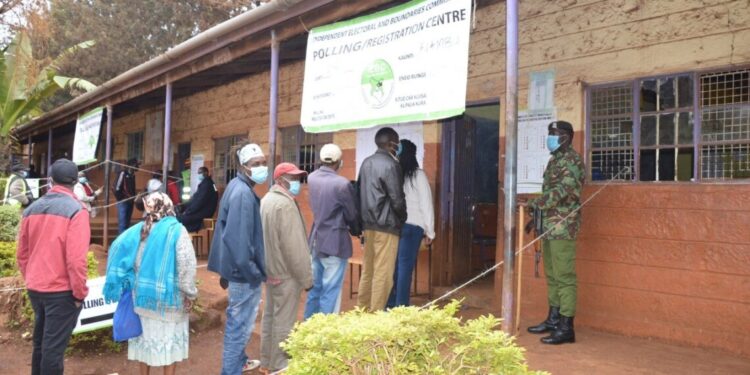Kenyans go to the polls on Tuesday, August 9, 2022 to elect their fifth president as well as parliamentary and county leaders.
Some 22.1 million registered voters in 47 counties will participate in the general election to choose the set of leaders to represent them for the next five years.
The Independent Electoral and Boundaries Commission (IEBC) cleared four candidates for the race to replace President Uhuru Kenyatta, who is completing his second and final five-year term. They include the current Deputy President, Dr William Ruto, and former Prime Minister Raila Odinga, once allies, but who have since turned into bitter political opponents. Odinga and Ruto are the frontrunners in the race that has seen intensive campaign action from both sides. The other two are little-known David Mwaure Waihiga and Prof George Wajackoya.
Odinga, popularly known as “Baba” (father), has long dominated opposition politics in Kenya. He and Ruto were on opposite sides in the 2013 and 2017 elections during which the Deputy President campaigned for his boss, Kenyatta. Both encounters provoked deadly violence between the supporters of both sides. Both times, Odinga challenged Kenyatta’s victory in the Supreme Court, the last of which resulted in the historic nullification of the presidential election results. Kenyatta went on to win the repeat election which Odinga boycotted, leading to violence that rocked the country.
A few months later, in March 2018, Kenyatta and Odinga astounded Kenyans when they appeared together in public and assured the citizens of their cooperation in a bid to restore peace and unity. Although, the rapprochement, commonly referred to as the “handshake”, brought calm to the country, it had the effect of alienating Ruto and his boss, who has been openly supporting Odinga’s fifth bid for the presidency.
Odinga is running on the ticket of the Azimio la Umoja alliance, a coalition of political parties that includes both his Orange Democratic Movement (ODM) party and the ruling Jubilee Party. The former prime minister has been serving as the African Union Representative for Infrastructure Development since 2018.
Ruto has served as Deputy President to Kenyatta for 10 years and will be trying for the top office for the first time. He heads the Kenya Kwanza alliance, which includes his party, the United Democratic Alliance (UDA), on whose ticket he is standing.
This year’s election will involve more than 16,000 candidates vying for the six positions on offer on the ballot – president, governor, senator, member of Parliament, woman representative, and member of county assembly. Only about 2,000 candidates will succeed.
Kenyan elections have for a long time been characterised by violence sparked by ethnic animosity and claims of rigging. These differences exploded into attacks and killings during the 2007 elections, with Odinga claiming interference by state authorities in favour of incumbent President Mwai Kibaki. At the time Ruto supported Odinga’s bid for the presidency while Kenyatta backed Kibaki.
More than 1,000 people were killed in the resulting post-election violence of 2007/2008 that hit six of Kenya’s eight provinces – Nairobi, North Rift Valley, Central Rift Valley, South Rift Valley, Nyanza, and Western provinces. More than 350,000 others were displaced, 900 were documented to have suffered sexual violence, while 3,500 others were reported to have suffered serious injury.
The violence placed Kenya on the world map as the situation attracted the intervention of the international community and brought the International Criminal Court (ICC) to its doorstep. It led to the Kenya cases at the ICC against Kenyatta, Ruto and four other persons, charged with crimes against humanity. The cases later collapsed due to witness interference. Lawyer Paul Gicheru was later charged at the ICC with the offence. His trial has been concluded and he is waiting for the court’s verdict.
The ICC charges united Kenyatta and Ruto, and catapulted them into seeking the presidency in the 2013 elections. Their anti-ICC, anti- Western world rhetoric won them many votes and placed them in the State House.
Despite the fact that the cases collapsed, the shadow of the ICC will for a long time loom over Kenya, especially during election periods. Many Kenyans have expressed hope that the threat of being dragged before the ICC will serve to deter politicians from orchestrating violence in a bid to support certain candidates. All the major presidential candidates have called for peace during and after the elections.
Waihiga is a lawyer and church minister. He is the head of the Agano party, which he founded in 2006. He was also a contender for the positions of Kenya’s chief justice and deputy chief justice.
Wajackoyah, who has been the focus of attention during the campaigns, heads the Roots Party. He has become known for his controversial statements about ligalising cannabis, and exporting snake venom and hyena testicles.
During the campaign period, civil society groups have been at the forefront of rooting for electoral integrity and political accountability. The Angaza Movement, a consortium of 18 organisations, has several times expressed concern about the preparedness of IEBC to conduct a free, fair, and verifiable election,







